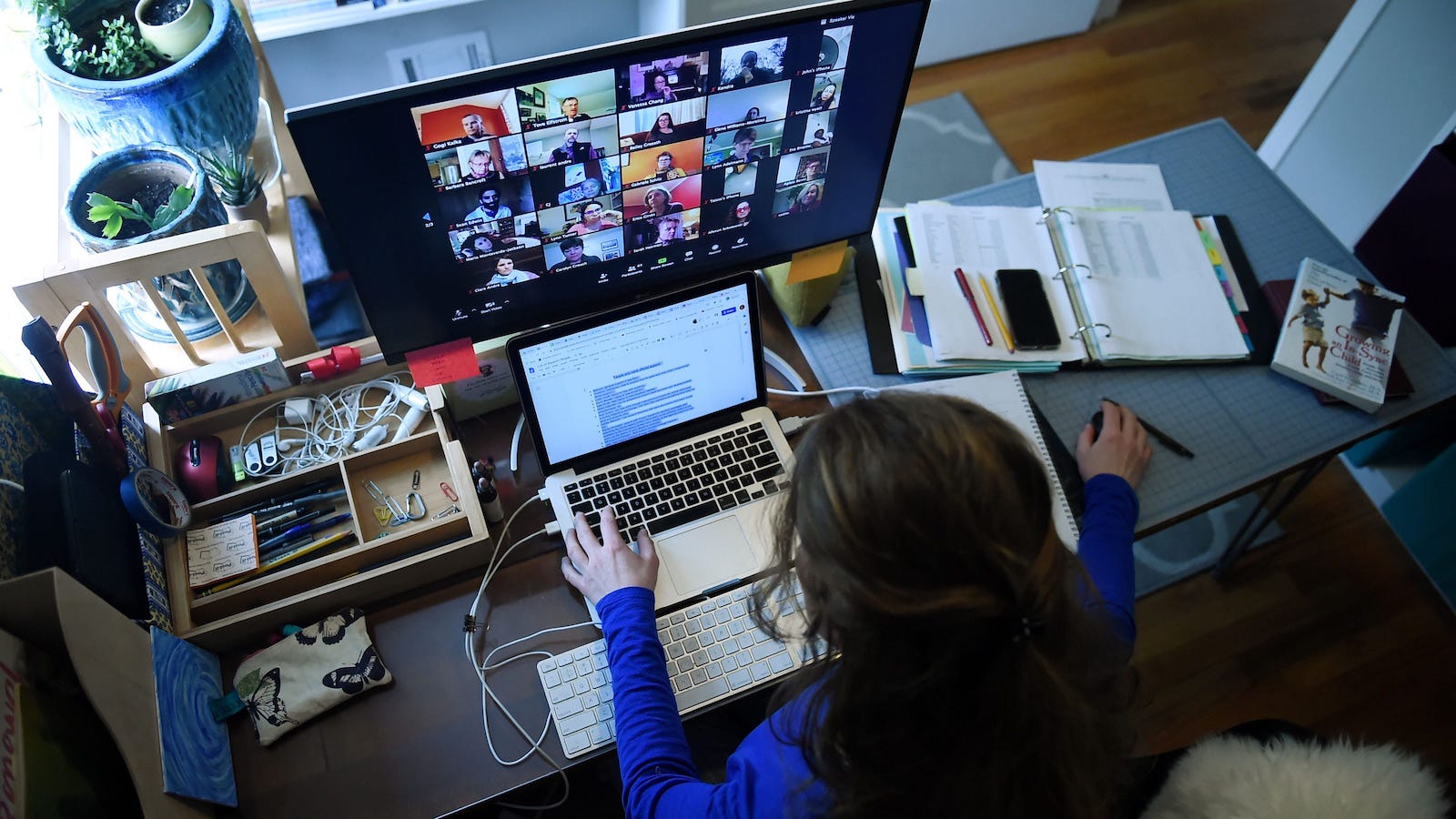
A Zoom Life Isn’t a Free Life
A comprehensive tally of the best times to answer work emails: at dinner with your family; while bathing a toddler; in between bedtime books; those few funny minutes after you’ve binned a dunged diaper and your infant is crawling around naked, giggling like a druggie who just scored a bag of angel dust; immediately after your kids have finally fallen asleep and your own consciousness is tapering like a sparkler at the end of its oxidizer bank.
And of course the most optimal time to rough out replies to colleague inquiries is at 2AM after soothing your shrieking spawn back to sleep following a bad dream. That really proves your dedication to the grind.
Those are scientifically proven moments. Both your co-workers and spouse—especially your wife—truly appreciate your rapid response on crucial, make-or-break-payroll matters, such as why that Excel sheet you sent seven hours prior is missing a “+” in the DP251 cell formulae.
It’s also when you’re fighting for freedom, and showing despots who’s the real boss of your life. That’s right: keeping your digitally frazzled eyes glued to your screen strikes a blow against tyranny.
Lewis M. Andrews posits as much in “How working from home threatens authoritarian regimes,” drafted for, of all pubs, Spectator World. Normally The Spectator is full of plummy prose and sharp witticisms that can never be accused of being too serious. (Its lettered editors were cheekily exacting enough to wish themselves a happy 10,000th hebomaversary two years ago.) Yet here is an earnest effort to analogize working in one’s undercrackers with leading an underground resistance against an intrusive commie centcom.
Everyone’s heard the old saw that one man’s terrorist is another’s freedom fighter. That doesn’t apply here: Zoom heads are in no way comparable to the Maquis. Polish solidarity wasn’t formed by the collective act of sitting at home. The American Revolution wasn’t won by keyboard warriors harping about the price of tea over Faceparchment. And, for the love of Godwin’s Law, arbeit ain’t making you frei.
So what’s Andrews talking about? How is cutting your commute down to the three minutes it takes to Keurig a mug of bland coffee and shuffle in bunny slippers to your particle-board desk a bold act for personal liberty?
Now, some fair play: I had to look up Mr.—sorry, Dr.—Andrews to reassure myself his thesis wasn’t just secret moonlighting on behalf of some trade association. He did apparently head up a free-market think tank in Connecticut—a potential sign of slavedriver-like tendencies. But his entire body of work suggests he is quite sincere in thinking that remote work is cocking a snoot at despotism.
But why? Because work-from-home challenges “authoritarian regimes whose survival requires a close and constant monitoring of their own citizens.” Totalitarian governments keep a grip on power by isolating and eliminating opposition. Singling out individual threats “becomes much harder when able-bodied workers spend more time in the privacy of their homes and backyards than on commuter trains and buses, at downtown restaurants, and in company offices.”
There you have it: stay home, save freedom!
The entire line of thinking comes off as just plain wacky after two years of Covidtide. When the Wuhan bug hit our shores, remote work was forced upon many. Businesses were shuttered for months—many never reopened. Schools, gyms, bars, and other gathering spots sat vacant for long stretches. But Andrews would have us believe this is a paradoxical kind of freedom.
I mean, honestly, Dr. Andrews, read the room. Or rather the empty streets and vacant sidewalks.
Andrews’s embrace of agoraphobia is confusing for someone so entrenched within the freedom movement. It would be a professional lapse if he hasn’t heard or read the harrowing tales of Eastern bloc dissidents cloistered in their tiny cement apartments, afraid to venture out into the streets for fear of being surveilled. Yes, tiny dwellings, like the Prague flat of Vaclav Brenda, provided a fastness against various Soviet-backed Securitates. But squandering hours away inside an SRO—or even a multi-bedroom house—isn’t freedom. Before COVID, we used to regard such an arrangement as imprisonment.
If there’s one thing the left’s most smashy activists get right is that “Whose streets? Our Streets!” packs visceral resonance. Your rights shouldn’t end where your door frame begins. Being constantly under the Panopticon thumb isn’t a problem to be avoided by retreating—it’s one to address head on by tearing it down and restoring anonymous privacy in the public square. The Ottawan truckers, despite disrupting international commerce, are standing athwart draconian government restrictions not from the comforts of Facebook, but on the freezing-cold streets of Canada’s capital city. The Hong Kong democracy protesters (remember them?) used encrypted social-media messaging to coordinate marching in the streets, not in the metaverse.
Set aside both the abstract theories and material necessities of freedom advocacy. Andrews doesn’t grasp how the internet functions. Remote work is rendered possible by two things: a computer and web access. Neither of those are immune from government snooping. Is Andrews aware of the NSA? Of digital advertising? Of cookies and tracers and retargeting and IP addresses and geofencing? Has he ever purchased a pair of socks on Amazon, only to be bombarded with endless suggestions for additional socks, not to mention Nike Monarchs, shoe deodorizer, and Dr. Scholl’s insoles?
Andrews may hold a doctorate in social psychology, but he’s apparently not opened a web browser since Internet Explorer 3.0. And despite his CV containing plenty of non-profit gigs, he doesn’t seem to know that employer-provided hardware is usually bugged by a third-party IT firm before it hits your doorstep. So, in addition to the Ft. Meade creepers hoovering up each and every keystroke you tap, an outside firm can, at any time, remotely commandeer your AirBook and take stock of your browser history. Work-from-home is Kennedy Gordy’s earworm on repeat, forever and ever.
Where Andrews twists his thinking into an unintelligible mess is his conflation of flexibility with freedom. Rolling out of bed and immediately starting to log hours is nice. But so is waking an hour earlier and reading a novel on the train ride into the office. As is interacting with colleagues face-to-face, not face-to-Zoom. Spontaneously joining your peers for happy hour after clocking out is another one of life’s small perks that can’t be replicated remotely.
Summing up human liberty to pure efficiency is a shallow—even soulless—view. It’s of a piece with healthism—the single-eyed view that the good life is equal to your white-blood-cells count.
The internet has been used to foster freedom and oppose dictatorial regimes. It’s also enabled peremptory bosses to keep a fetter on employees, pinging their smartphones day and night, at any hour. No tool is unequivocally good or bad; to what end a tool is used is decided by homo faber.
Freedom has a purpose. It’s not to ride a desk for eight hours a day as your leg thews slowly atrophy. Liberty isn’t liberty when hemmed within four walls. That’s called the clink. Dr. Andrews needs to close his laptop, walk outside, and take a deep breath of fresh air. That alone is more freeing than anything found on a screen.
Free the People publishes opinion-based articles from contributing writers. The opinions and ideas expressed do not always reflect the opinions and ideas that Free the People endorses. We believe in free speech, and in providing a platform for open dialogue. Feel free to leave a comment.



